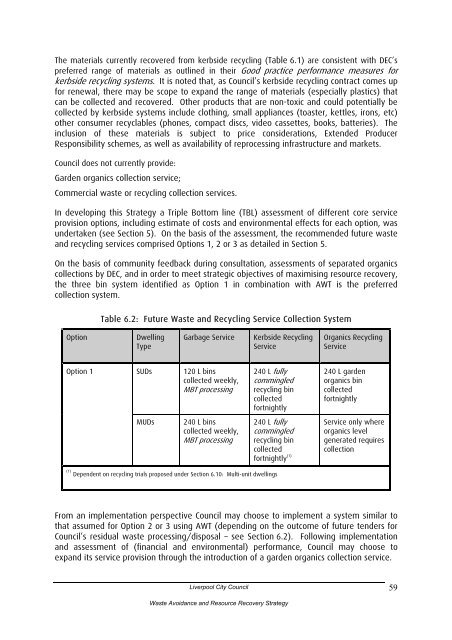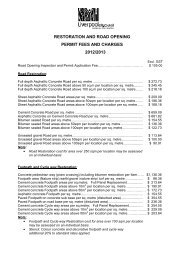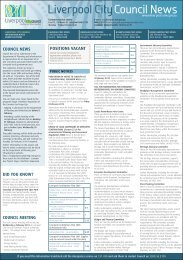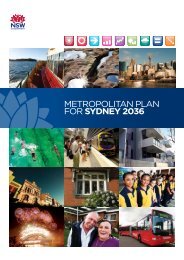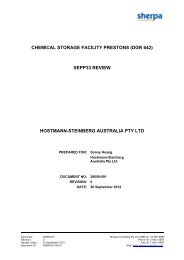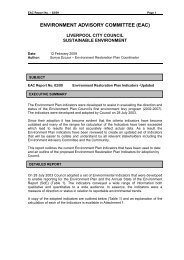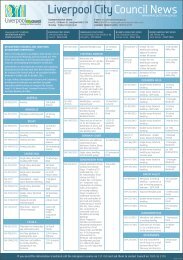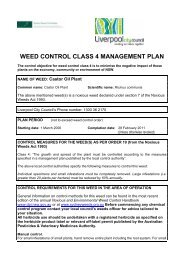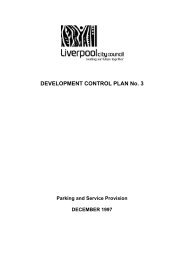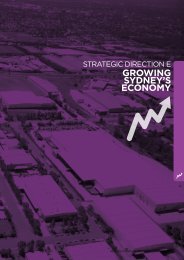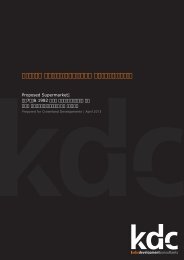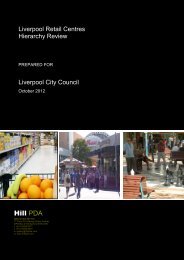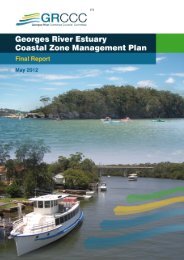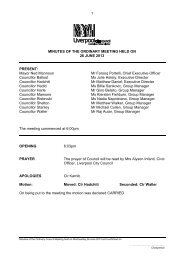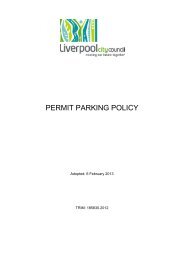to view the WARR Strategy. - Liverpool City Council - NSW ...
to view the WARR Strategy. - Liverpool City Council - NSW ...
to view the WARR Strategy. - Liverpool City Council - NSW ...
Create successful ePaper yourself
Turn your PDF publications into a flip-book with our unique Google optimized e-Paper software.
The materials currently recovered from kerbside recycling (Table 6.1) are consistent with DEC’spreferred range of materials as outlined in <strong>the</strong>ir Good practice performance measures forkerbside recycling systems. It is noted that, as <strong>Council</strong>’s kerbside recycling contract comes upfor renewal, <strong>the</strong>re may be scope <strong>to</strong> expand <strong>the</strong> range of materials (especially plastics) thatcan be collected and recovered. O<strong>the</strong>r products that are non-<strong>to</strong>xic and could potentially becollected by kerbside systems include clothing, small appliances (<strong>to</strong>aster, kettles, irons, etc)o<strong>the</strong>r consumer recyclables (phones, compact discs, video cassettes, books, batteries). Theinclusion of <strong>the</strong>se materials is subject <strong>to</strong> price considerations, Extended ProducerResponsibility schemes, as well as availability of reprocessing infrastructure and markets.<strong>Council</strong> does not currently provide:Garden organics collection service;Commercial waste or recycling collection services.In developing this <strong>Strategy</strong> a Triple Bot<strong>to</strong>m line (TBL) assessment of different core serviceprovision options, including estimate of costs and environmental effects for each option, wasundertaken (see Section 5). On <strong>the</strong> basis of <strong>the</strong> assessment, <strong>the</strong> recommended future wasteand recycling services comprised Options 1, 2 or 3 as detailed in Section 5.On <strong>the</strong> basis of community feedback during consultation, assessments of separated organicscollections by DEC, and in order <strong>to</strong> meet strategic objectives of maximising resource recovery,<strong>the</strong> three bin system identified as Option 1 in combination with AWT is <strong>the</strong> preferredcollection system.Table 6.2: Future Waste and Recycling Service Collection SystemOptionDwellingTypeGarbage ServiceKerbside RecyclingServiceOrganics RecyclingServiceOption 1 SUDs 120 L binscollected weekly,MBT processingMUDs240 L binscollected weekly,MBT processing240 L fullycommingledrecycling bincollectedfortnightly240 L fullycommingledrecycling bincollectedfortnightly (1)240 L gardenorganics bincollectedfortnightlyService only whereorganics levelgenerated requirescollection(1)Dependent on recycling trials proposed under Section 6.10: Multi-unit dwellingsFrom an implementation perspective <strong>Council</strong> may choose <strong>to</strong> implement a system similar <strong>to</strong>that assumed for Option 2 or 3 using AWT (depending on <strong>the</strong> outcome of future tenders for<strong>Council</strong>’s residual waste processing/disposal – see Section 6.2). Following implementationand assessment of (financial and environmental) performance, <strong>Council</strong> may choose <strong>to</strong>expand its service provision through <strong>the</strong> introduction of a garden organics collection service.<strong>Liverpool</strong> <strong>City</strong> <strong>Council</strong>59Waste Avoidance and Resource Recovery <strong>Strategy</strong>


